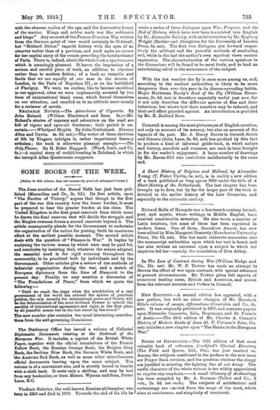SOME BOOKS OF THE WEEK.
[&ties m Mi. nisinn don nal Immoral/ yrsstude subsopisni mina.] The Jane number of the Bound Table has just been pub- lished (Macmillan and Co., 2s. 6d.). Its first article, upon "The Burden of Victory," argues that though in the first part of the war this country bore the lesser burden, it math be prepared to bear the greater burden at the close. The United Kingdom is the first great reservoir from which must be drawn the final reserves that will decide the straggle, and the Empire overseas forms a second reservoir beyond it. The article consequently pleads for the Government to undertake the organization of the nation for putting forth its maximum effort at the earliest possible moment. The second article deals with the question of "Finance in War." It begins by analysing the various means by which ware may be paid for, and concludes by insisting that, whatever the means adopted, the essential need is for rigid economy throughout the community, to be practised both by individuals and by the Government. Other articles give a review of the methods of industrial organization during the war, and a sketch of European diplomacy from the time of Bismarck to the present day. Finally, we may mention a discussion of "The Foundations of Peace," from which we quote the following:— "Until we reach the stage when the constitution of a real government of the world has entered the sphere of practical 'politics, the only security for international peace and liberty will be the determination of the most civilised Powers to uphold the sanctity of international agreements and right, in the first place by all peaceful means but in the Mat resort by the sword."
The new number also contains the usual interesting contribu- tions from the self-governing Dominions.


































 Previous page
Previous page